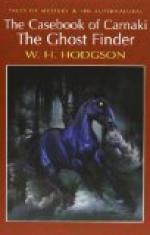“We turned a small army on to the work, and within ten days, that lovely thing had gone up in smoke, and what was left was calcined, and clean.
“It was when the workmen were stripping the paneling, that I got hold of a sound notion of the beginnings of that beastly development. Over the great fireplace, after the great oak panels had been torn down, I found that there was let into the masonry a scrollwork of stone, with on it an old inscription, in ancient Celtic, that here in this room was burned Dian Tiansay, Jester of King Alzof, who made the Song of Foolishness upon King Ernore of the Seventh Castle.
“When I got the translation clear, I gave it to Tassoc. He was tremendously excited; for he knew the old tale, and took me down to the library to look at an old parchment that gave the story in detail. Afterward, I found that the incident was well-known about the countryside; but always regarded more as a legend than as history. And no one seemed ever to have dreamt that the old East Wing of Iastrae Castle was the remains of the ancient Seventh Castle.
“From the old parchment, I gathered that there had been a pretty dirty job done, away back in the years. It seems that King Alzof and King Ernore had been enemies by birthright, as you might say truly; but that nothing more than a little raiding had occurred on either side for years, until Dian Tiansay made the Song of Foolishness upon King Ernore, and sang it before King Alzof; and so greatly was it appreciated that King Alzof gave the jester one of his ladies, to wife.
“Presently, all the people of the land had come to know the song, and so it came at last to King Ernore, who was so angered that he made war upon his old enemy, and took and burned him and his castle; but Dian Tiansay, the jester, he brought with him to his own place, and having torn his tongue out because of the song which he had made and sung, he imprisoned him in the Room in the East Wing (which was evidently used for unpleasant purposes), and the jester’s wife, he kept for himself, having a fancy for her prettiness.
“But one night, Dian Tiansay’s wife was not to be found, and in the morning they discovered her lying dead in her husband’s arms, and he sitting, whistling the Song of Foolishness, for he had no longer the power to sing it.
“Then they roasted Dian Tiansay, in the great fireplace—probably from that selfsame ‘galley-iron’ which I have already mentioned. And until he died, Dian Tiansay ceased not to whistle the Song of Foolishness, which he could no longer sing. But afterward, ‘in that room’ there was often heard at night the sound of something whistling; and there ’grew a power in that room,’ so that none dared to sleep in it. And presently, it would seem, the King went to another castle; for the whistling troubled him.
“There you have it all. Of course, that is only a rough rendering of the translation of the parchment. But it sounds extraordinarily quaint. Don’t you think so?”




